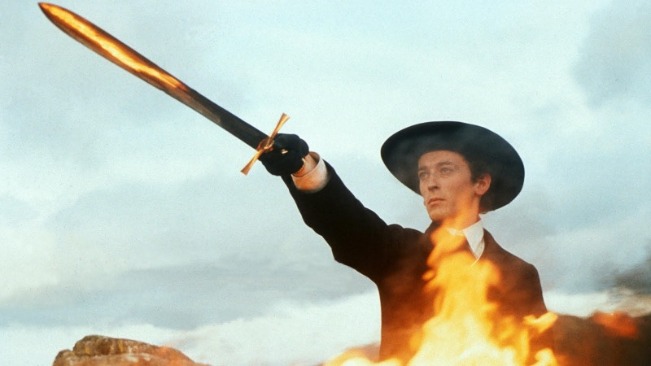RELATED ARTICLE
Women in Love: Bohemian Rhapsody
More Is More: Lessons in Excess from Women in Love
By Joe Talbot
The Criterion Collection

BOOM! Mahler
(1974) begins auspiciously and iconoclastically, as befits its director, with a
peaceful lakeside scene shattered by an abrupt conflagration. The combusting
hut echoes Kiss Me Deadly and anticipates The Sacrifice and Lost
Highway (Lynch: “I got this IMAGE in my head, and I went up to the special
effects guy and asked him what kind of REALLY POWERFUL EXPLOSIVES he had, and
he said he had A LOT, but he could GET MORE.”) This is a Ken Russell musical
biopic.
The only time Russell, Britain’s mad genius, enjoyed critical acclaim was his early days at the BBC, making documentaries about composers. Then he started making features, and after Women in Love (1969), which was widely admired, went mad, according to his critics. Although the date of lunacy’s onset keeps getting pushed forward, from The Music Lovers to The Devils, both from 1971, to the eighties, to the nineties. The establishment admits it was wrong, but only in increments.
Mahler comes from 1974, after the critical wave of revulsion had peaked (imagine if Michael Powell had kept making Peeping Tom, again and again, to the same furious response) and the momentum of his early box-office success had faded. One of the film’s producers, David Puttnam, felt that the lashing Russell had received had unbalanced him, and that rather than rising above such a tsunami of hate, Russell had felt compelled to double down on the very qualities that made him anathema. Although, in fairness, as early as The Devils the director had been asking collaborators, “What can I do that will really upset the British public?”
That question may be lurking behind Mahler too, since it shows scant regard for history, chronology, genre, or taste, presenting a phantasmagoria of its subject’s life and music. If you took a test on Gustav Mahler after watching it, I think you’d get about 5 out of 100. But your enthusiasm for the subject may have been raised.

Mahler (Robert Powell, Zeffirelli’s Jesus) wakes from an explosive dream. He is taking the train with his wife, Alma (Russell favorite Georgina Hale, who must have just had a nice holiday as her depraved cherub face, and as we’ll see later, the rest of her, is a rather un-Austrian shade of orange). Since Russell was frightened by Citizen Kane at an early age, the composer’s life will unfold out of sequence in flashback reveries, so the film is composed of movements rather than acts: I’m not being pretentious, it really is. The use of a locomotive journey as framing device might invoke Brief Encounter, but as Bernard Herrmann would have put it, “This is a train of DEATH!”
Russell liked episodic structures, I think, because they let him build to multiple climaxes, so here we drop in and out of the railway journey, where Mahler may be dying and/or breaking up with Alma, and into and out of dreams, reveries, and pastiches featuring his music. We learn of his marriage, his frustration of his wife’s musical ambitions, the death of a child. In one fantasy, Alma emerges from a chrysalis to embrace a stone head of Mahler, and in another, Russell swipes the premature burial from Dreyer’s Vampyr—Mahler staring from the window of his coffin, witnessing his own funeral—but with added Nazi striptease, and then it goes all Busby Berkeley (another major, major Russell influence). You can sort of see why this stuff gave the broadsheet reviewers conniptions.
Russell’s dialogue can be arch, too, and he never met a cheesy pun he didn’t like, and he encourages his actors to go overboard. Powell has a natural subtlety but he gamely puts on a voice. Hale snaps and chirrups and essays a series of funny walks, aided by Shirley Russell’s spectacular costumes. (I love two of Russell’s Hollywood pictures, Altered States and Crimes of Passion, but his golden age is the seventies when he and Shirley were together.) Russell affected disdain for the lowbrow British comedies that infested the Bijous and Roxies of his youth (the shrill drag act of Mother Reilly came in for particular scorn), but he must have picked up some of his end-of-the-pier revue humor from Southhampton’s sea air. And you see, the one thing respectable reviewers particularly hate is when you can’t decide whether to be Federico Fellini or Benny Hill (though the distance between is not so great as appears).
Outdoors stuff is shot in the spectacular Lake District, which had become practically a religion for Ken. And he has Mahler espouse a pantheistic view of nature strikingly close to his own. Russell had converted to Catholicism, I suspect for the theatricality and kink of it, but then lost his faith while making The Devils and found the epic landscapes of Cumberland instead. Having Mahler explain the soul to his two little daughters is a lovely touch: Russell doesn’t always have to be camp and acid, he can be sincere and spiritual. The difficulty for some is that his gear shifts are so very, very abrupt, and like his favorite composers, he goes all out. “The critic’s favorite word is restraint,”he growled, “Picasso was not restrained, Mahler was not restrained!”
Russell’s critical travails are particularly relevant since Mahler is not only an underrated film—it escaped the brutal denunciation accorded Russell’s bigger films, but was rewarded with neglect instead—it deals with the plight of the underrated artist, leading one to suspect that the filmmaker is including himself in rather hallowed company. Well, he was not short of ego.